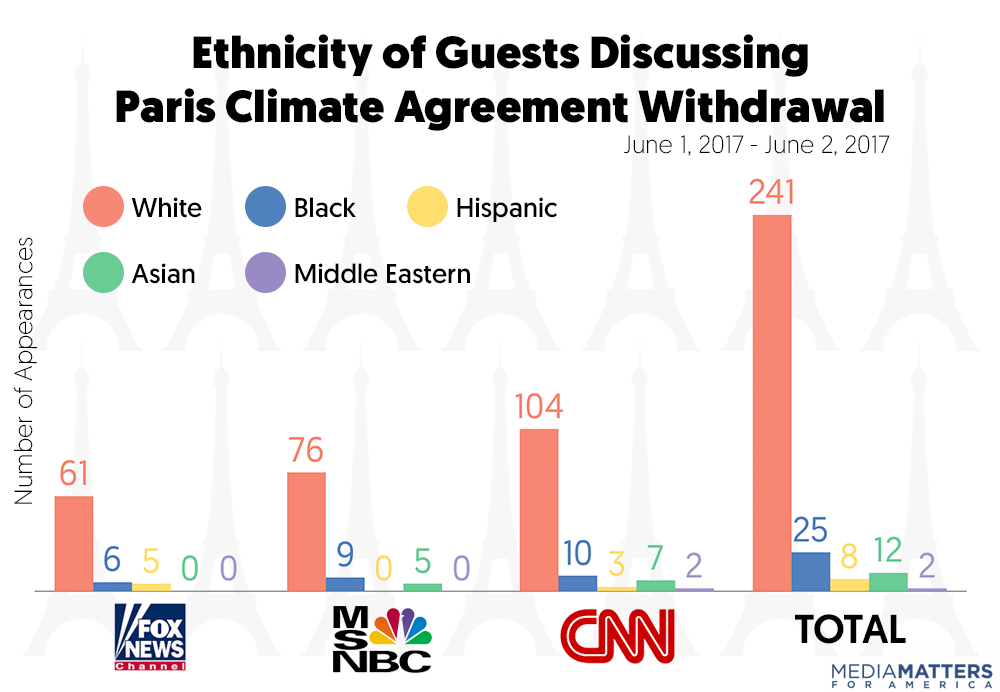A Media Matters study found that cable news outlets mostly marginalized people of color from discussions about climate change and the Paris accord following President Donald Trump's June 1 announcement that the United States would withdraw from the Paris climate agreement. This trend is particularly problematic in discussions of climate change because studies show that climate change disproportionately affects black and Hispanic communities.
A review of guests discussing climate change on Fox News, MSNBC, and CNN between June 1 and June 2 found that out of 286 guests* who cable channels invited on to discuss the issue, only about 17 percent were people of color -- 9 percent were black, 3 percent were Hispanic, 4 percent were of Asian descent, and less than 1 percent were of Middle Eastern descent.

The lack of representation is striking because studies show that climate change disproportionately affects minorities. In a June 2 article for Essence magazine, activist and political commentator Symone Sanders explained that leaving the Paris agreement will exacerbate some of the problems African-American communities face, including natural disasters like Hurricane Katrina and environmentally related health problems including respiratory diseases and heart conditions. A 2015 report by the NAACP noted that the tendency of African-Americans to live in cities, in coastal areas, and near polluting facilities like coal-fired power plants poses specific health risks and makes them more vulnerable than others to the effects of climate change. A 2016 report by the Natural Resources Defense Council (NRDC) pointed out that Hispanic communities are disproportionately harmed by climate change in part because a majority of Latinos live in states prone to extreme heat, air pollution, and flooding. Additionally, climate-related health concerns are particularly dire for Latinos given that they are “heavily represented in crop and livestock production and construction,” which contributes to them being “three times more likely to die ... from excessive heat than non-Latinos.” They are also less likely to have health insurance coverage than non-Latinos.
These factors may help explain why people of color are more likely than white voters to support the Paris agreement and to support regulation designed to combat climate change, and why lawmakers who belong to minority groups have “near-perfect” environmental voting records.
Yet, despite the intersectionality, TV news outlets often fail to make the connection between climate change and racial justice -- perhaps, in part, because they don't include many minority voices in their coverage.
Minority groups have condemned the dearth of minority voices in the media. Hispanic groups have called on the media to improve the visibility of Hispanics on air, noting that Hispanic voices are mostly restricted to discussing immigration, which creates the perception that they are a single-issue constituency. Other communities of color and low-income communities are also excluded from media coverage of climate change, as NAACP’s Jacqueline Patterson pointed out in an interview with The Nation in 2014: “The voice of frontline communities, the ones that are most impacted, usually don’t make it to the airwaves.”
When minority voices do find a foothold in the climate change discussion, the intersectionality of the issues becomes more apparent. African-American journalist April Ryan, one of the few non-white guests invited to discuss the Paris decision on CNN, emphasized the real-life human consequences of climate change, including disasters like Katrina, floods, droughts, and mosquito-borne diseases.
Additionally, in Spanish-language media’s coverage on Univision and Telemundo, reports on the United States’ withdrawal from the Paris accord explained the impact of climate change on Hispanics and provided a platform for Latinos to voice their opposition to the move.
Irissa Cisternino contributed research to this piece.
Methodology
Media Matters searched SnapStream and Nexis using the search terms “climate or Paris” on CNN, MSNBC, and Fox News from June 1 through June 2 and reviewed the transcripts for segments about Donald Trump's decision to pull out of the Paris climate agreement that aired between between 5 a.m. EST and 11 p.m. EST. Segments where Trump's decision to pull out of the Paris accord was the stated topic of discussion or segments where there was significant discussion of Trump's decision to pull out of the Paris accord were counted. “Significant discussion” was defined as at least two speakers in the segment engaging on the topic with one another (e.g., the host asking a guest a question on Trump's decision). Segments where a guest mentioned the decision in passing -- where no other guest engaged with the comment -- were excluded. All guests were coded for race/ethnicity. In one case, the race/ethnicity of the guest was unclear, so that person was not counted.
*For one guest who is both black and Hispanic, both backgrounds were counted. As a result, there are 288 race/ethnicities listed for the 286 guests. Because the study was focused on representation of minorities, guests who are both white and belonging to a minority group were coded only for the latter.